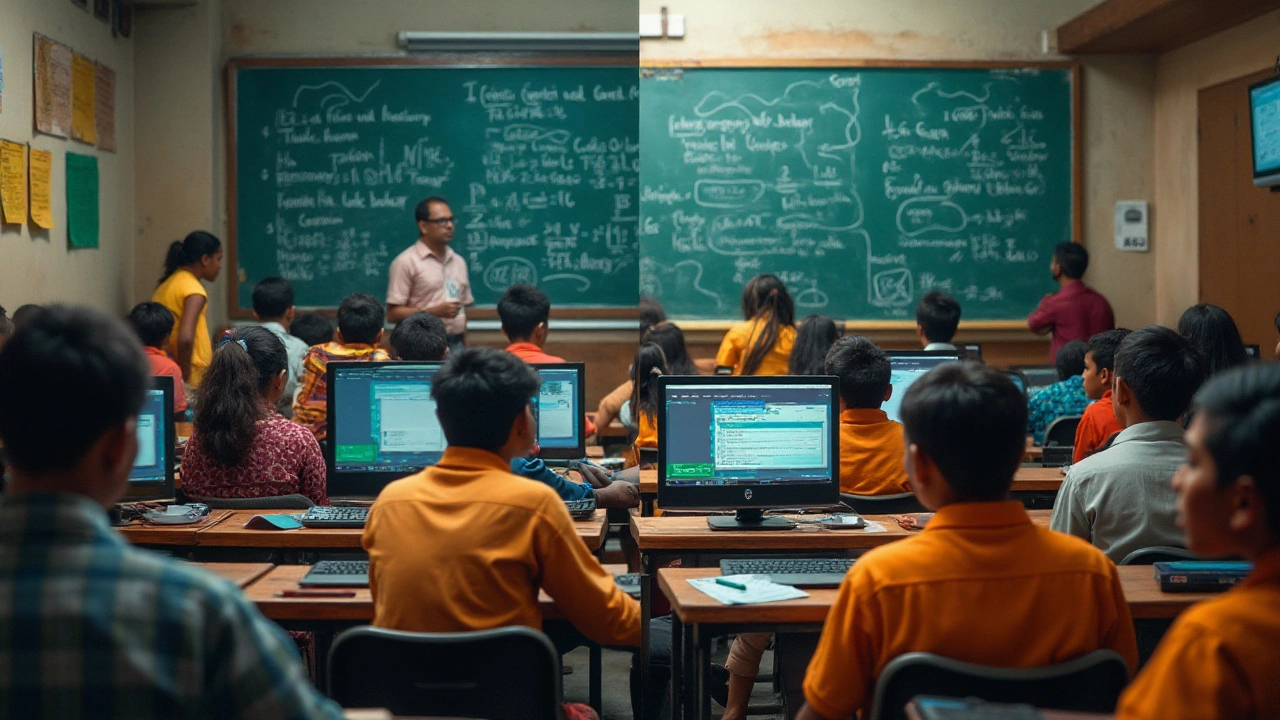When you hear discussions about coding and math, you often stumble upon a heated debate over which is tougher. Both coding and math are fields that require precision and unique skills, yet they are fundamentally different in approach and application.
Coding, in particular, is a craft that marries creativity with logic. It often feels like constructing a puzzle where every piece must fit in its proper place. The learning curve can be steep, especially when you dive into new languages or platforms.
Math, on the other hand, is often seen as the language of the universe. It requires a deep understanding of theoretical concepts and the ability to solve intricate problems with no room for ambiguity. So, which one is harder? Perhaps neither — or maybe both, depending on whom you ask.
- Understanding Coding
- Exploring Mathematics
- Comparative Challenges
- Skill Sets Required
- Helpful Tips for Learners
Understanding Coding
Diving into the world of coding is akin to uncovering a new layer of reality, one composed of logic and syntax rather than atoms and molecules. At its core, coding is the process of creating instructions for computers to perform specific tasks. These tasks can be simple, like adding two numbers, or complex, like rendering a video game.
There's a common misconception that coding is merely about learning programming languages. While understanding syntax is crucial, the true essence of coding lies in its logical structure and problem-solving nature. Being proficient in coding means grasping the ability to break down problems into smaller, manageable components and develop a step-by-step solution. Experienced coders often say that the language you choose is less important than learning how to think like a coder. This sentiment supports the notion that coding is less about the language syntax and more about the methodology.
"Programs must be written for people to read, and only incidentally for machines to execute." — Harold AbelsonAs you progress in the coding journey, you'll realize that it's also an art. It involves creativity similar to what you might find in writing a novel or painting a masterpiece. Many coders find themselves deeply absorbed, almost lost, in the complex world they create from scratch. The thrill of solving a challenging problem, or seeing your ideas come to life on screen, is profoundly satisfying.
We're witnessing a massive shift towards learning to code; according to recent studies, millions of students worldwide are enrolled in coding bootcamps or online courses. These platforms provide cover both the technical aspects of various programming languages and the soft skills needed to thrive in the tech industry. Coding might seem daunting at first, especially with all the seeming gibberish involving semicolons, brackets, and algorithms. But as with any new language, persistence, and practice gradually dissolve the barriers, making way for fluency and confidence.
Another essential aspect of coding lies in its application. Unlike many theoretical fields, coding is inherently practical. It's used in developing modern-day applications, ranging from mobile apps like Instagram to more sophisticated software systems like the ones NASA uses. Coding is everywhere, and understanding it opens up myriad opportunities in virtually every industry. As we continue to embrace technology at an ever-increasing pace, the demand for skilled coders will only grow.
The Path to Mastery
For those just starting in coding, resources abound. From free resources like Codecademy and Khan Academy to robust paid platforms like Udacity and Coursera, there's no shortage of paths to explore. Many find it beneficial to combine these resources with hands-on projects, which not only solidify knowledge but also create a tangible portfolio that showcases your skills to prospective employers or clients.
In conclusion, while challenging, coding remains a rewarding and crucial skill in today's digital era. With dedication and a curiosity-driven mindset, you can unlock the potential in coding, transcending from a mere user of technology to a creator. Whether you're aspiring to design the next big app or simply cherishing the joy of solving a complex logical puzzle, coding offers an exhilarating journey where learning never truly ends.
Exploring Mathematics
When venturing into the world of mathematics, one can't help but marvel at its complexity and beauty. Mathematics is a field rooted deeply in logic and abstract thinking, a discipline where precise definitions and proofs are paramount. It spans from basic arithmetic that even school kids are familiar with to more advanced topics like calculus and linear algebra, which form the backbone of various scientific domains. Its rich history is marked by the contributions of renowned mathematicians like Euclid and Einstein, each of whom expanded our collective understanding in remarkable ways.
To delve deeper, consider the concept of calculus. This branch of mathematics, created by Newton and Leibniz, explores the changes and motions of everything from tiny particles to astronomical bodies. It's foundational in any field that studies change, whether it's predicting the orbit of a satellite or optimizing a business process. Such profound impact illustrates how math is not just about numbers but about solving real-world problems. To truly excel, one must develop a strong sense of abstraction, the ability to visualize how different equations interrelate, and the patience to work through complex problems.
Many students often find themselves intimidated by the complexity of mathematics, equating it with insurmountable difficulty. However, this perception could be shifted by understanding its logical foundation. Albert Einstein famously stated,
"Pure mathematics is, in its way, the poetry of logical ideas."This statement reflects how, despite its rigorous nature, mathematics embodies a form of creative expression that, once appreciated, can transform one's approach to tackling its challenges.
Mathematics is not a monolith; within its vast realm, various specialties cater to different interests. Statistics, for example, is critical for interpreting data across myriad fields like healthcare and economics. Geometry, another branch, is fundamental in architecture and art, demonstrating math's versatility. A robust understanding of these branches allows us to approach problems from different angles, fostering both critical thinking and creativity.
For those embarking on a journey in mathematics, a few strategies can elucidate the path ahead. First and foremost, adopting a mindset that views challenges as opportunities is critical. Every incorrect problem can be a springboard to more profound understanding. Regular practice is also crucial—rewarding mathematics proficiency with improved logic and problem-solving skills. Secondly, seeking out resources like online courses or math-focused forums can provide a community of like-minded learners. Engaging with a community can demystify challenging concepts, as collaborative learning often reveals insights neglected in singular study.

Comparative Challenges
When diving into the debate of whether coding or math brings more challenges, one immediately stumbles upon the fundamental differences in their nature. Coding is an intricate dance of logic and creativity, allowing for multiple paths to reach the same outcome. A coder might approach a problem with a dozen different solutions, choosing one based on efficiency, readability, or personal preference. It’s a field where innovation thrives, and often, mistakes become learning opportunities rather than failures.
In contrast, math is a discipline grounded in rule-based precision. Each problem typically follows a predetermined path to a single, correct answer, making it a domain where creativity lies in the method of arriving at solutions rather than in the solutions themselves. The skill lies in understanding abstract concepts and applying them correctly within a rigid framework. This precision can make math seem more daunting to some, as errors often point to a misunderstanding that requires retracing steps meticulously to correct.
The challenges of coding are often rooted in the complexity of translating human logic into a language a machine understands. For those venturing into programming, syntax errors become commonplace, and the frustration of debugging can be both a great teacher and a stern enemy. Coding is not just about writing lines of text; it requires analytical thinking, persistence, and sometimes, a leap of faith into the unknown. Computer programming languages, like Java or Python, manifest unique challenges simply because of their syntax-driven nature.
Meanwhile, math's challenges are steeped in its dependency on abstract thinking and problem-solving. Mathematics demands a deeper level of understanding that transcends everyday logic. Developing a firm grasp on concepts such as calculus or linear algebra requires not just rote memorization, but the ability to visualize and mentally manipulate complex ideas. The journey through math involves mastering a series of interconnected concepts that build upon each other relentlessly, leaving no gap in understanding unpunished.
Interestingly, a study by the National Centre for Educational Statistics highlighted that around 28% of students find high-level math subjects challenging at first encounter, but this perceived difficulty reduces as familiarity with concepts increases. These statistics reinforce the notion that practice significantly contributes to proficiency in math, perhaps more so than in coding, where the landscape is ever-evolving.
"In the realm of science and engineering, nothing ventured is often just as much, if not more, a loss than nothing gained." — Carl Sagan. This quote aptly captures the spirit of both math and coding, where the willingness to tackle challenges often leads to groundbreaking discoveries.
In summary, whether coding or math proves more challenging largely depends on individual strengths and preferences. Both fields offer unique hurdles, ensuring that those who master them emerge with finely honed problem-solving skills and logical acumen. Ultimately, engaging deeply with either or both disciplines enriches one's cognitive toolkit, empowering them to tackle diverse, real-world challenges with confidence.
Skill Sets Required
When we step into the realm of coding and math, the distinct skill sets required for each field become evident. Beginning with coding, it’s clear that attention to detail ranks high on the essential attributes list. A single misplaced semicolon or incorrect syntax can render hundreds of lines of code ineffective. Moreover, coding demands a significant amount of patience and persistence. Every coder knows the inevitable frustration when a solution seems just out of reach. This discipline requires a mindset that is not only logical but also innovative, as solving coding challenges often means thinking outside the box.
Beyond patience, coders need to garner analytical skills. These are crucial when assessing how different parts of a program interact. Coders frequently juggle multiple blocks of information, and the ability to compartmentalize and interconnect them is invaluable. Understanding data structures and algorithms can streamline processes and optimize outcomes. An intriguing fact is that many tech giants like Google often emphasize these skills during their hiring process.
Switching to math, it’s important to underline that the skill set is both overlapping and divergent from coding. Math demands rigorous logical reasoning akin to coding, yet it reinforces this foundation with abstract thinking. It’s one thing to follow a logical progression; it’s another to conceptualize abstract models of thought. For instance, mathematicians frequently engage with spatial reasoning, visualizing scenarios beyond the tangible world to come up with solutions. Moreover, proficiency in math usually means having a robust grasp of core concepts first, such as arithmetic and algebra—to advance to more sophisticated areas like calculus or linear algebra.
According to Albert Einstein, "Pure mathematics is, in its way, the poetry of logical ideas." This highlights the inherent beauty and complexity in math that resonates with those drawn to abstract challenges.
While patience is also a virtue in math, precision is critical. A slight error can cascade into a major miscalculation, derailing entire logical frameworks. Creativity in math is often underestimated. Mathematicians sometimes discover revolutionary concepts and solutions by approaching problems from unexpected angles. Let's consider the real-world application of these skills: both coding and math heavily influence fields like cryptography, which relies on coding algorithms underpinned by complex mathematical theories.
Key Differences and Overlaps
- Attention to Detail: Both fields require meticulous accuracy, but the nature of their work differs significantly.
- Logical Reasoning: A common thread in both fields, yet math extends logical thinking to a more abstract domain.
- Patience and Persistence: Essential for overcoming challenges whether you're facing a stubborn bug in the code or a tough mathematical problem.
- Creativity: Often seen as more applicable in artistic fields, creativity is indispensable in both coding and math for innovation and problem-solving.
As the landscape of technology evolves, the lines between coding and math blur, with the necessity for these skills becoming more intertwined in industries across the board. Whether you choose to delve into coding or math, honing these skills will undoubtedly open doors to vast opportunities.

Helpful Tips for Learners
Embarking on a journey to learn either coding or math can feel daunting, but the right strategies can simplify the process. First, start by establishing a solid foundation. With coding, familiarize yourself with basic concepts like variables, control flows, and data structures. For math, ensure you have a strong grasp of arithmetic, algebra, and geometry before moving to advanced topics. It's important because both skills often build on previous knowledge, so make sure your foundational blocks are sturdy.
Another key tip is to immerse yourself in practice. Theory is essential, but applying what you learn crystallizes your understanding. For coders, try to solve real-world problems by building simple apps or contributing to open-source projects. Mathematicians can benefit from solving puzzles or engaging in competitions that inspire thinking outside the box. Immersing in practice not only boosts confidence but also reveals patterns and aids in retaining information.
Mentorship and peer support can greatly enhance your learning experience. Whether it's through online coding forums or math clubs, being part of a community provides access to valuable resources and insights. Engage in discussions, ask questions, and offer help, which can consolidate your own understanding. Many enthusiasts find that explaining concepts to others also cements their own learning, creating a collaborative environment that benefits everyone involved.
"Learning is not attained by chance, it must be sought for with ardor and diligence." — Abigail AdamsDedicate time consistently to your studies. Allocate specific hours, whether daily or weekly, to study coding or math. Consistent practice is vital for developing a routine and embedding habits that hold you accountable. Over time, this commitment reaps rewards as you notice significant progress in your skills.
Employ a multi-sensory learning approach. Use videos, podcasts, and interactive apps to complement traditional textbooks. For kinesthetic learners, writing code or solving equations by hand can solidify understanding in ways that digital means may not. Mixing these methods keeps learning exciting and shapes a well-rounded comprehension. Coding apps often provide instant feedback, crucial for navigating the debugging process effectively.
Lastly, don't shy away from challenges, as they foster growth. Embrace mistakes as opportunities to learn. In coding, errors are a part of programming, providing lessons in problem-solving, and teaching patience. Similarly, facing tough mathematical problems sharpens analytical skills, pushing boundaries of what you believe you can achieve. Remember, every expert was once a beginner who didn't give up.
Adopt a mindset of perseverance and curiosity. Successful learners ask questions and explore unknowns. Be curious about how your knowledge applies in real life and seek to understand rather than memorize. This approach not only nurtures a robust understanding but also makes the learning process enjoyable, transforming challenges into exciting opportunities.
